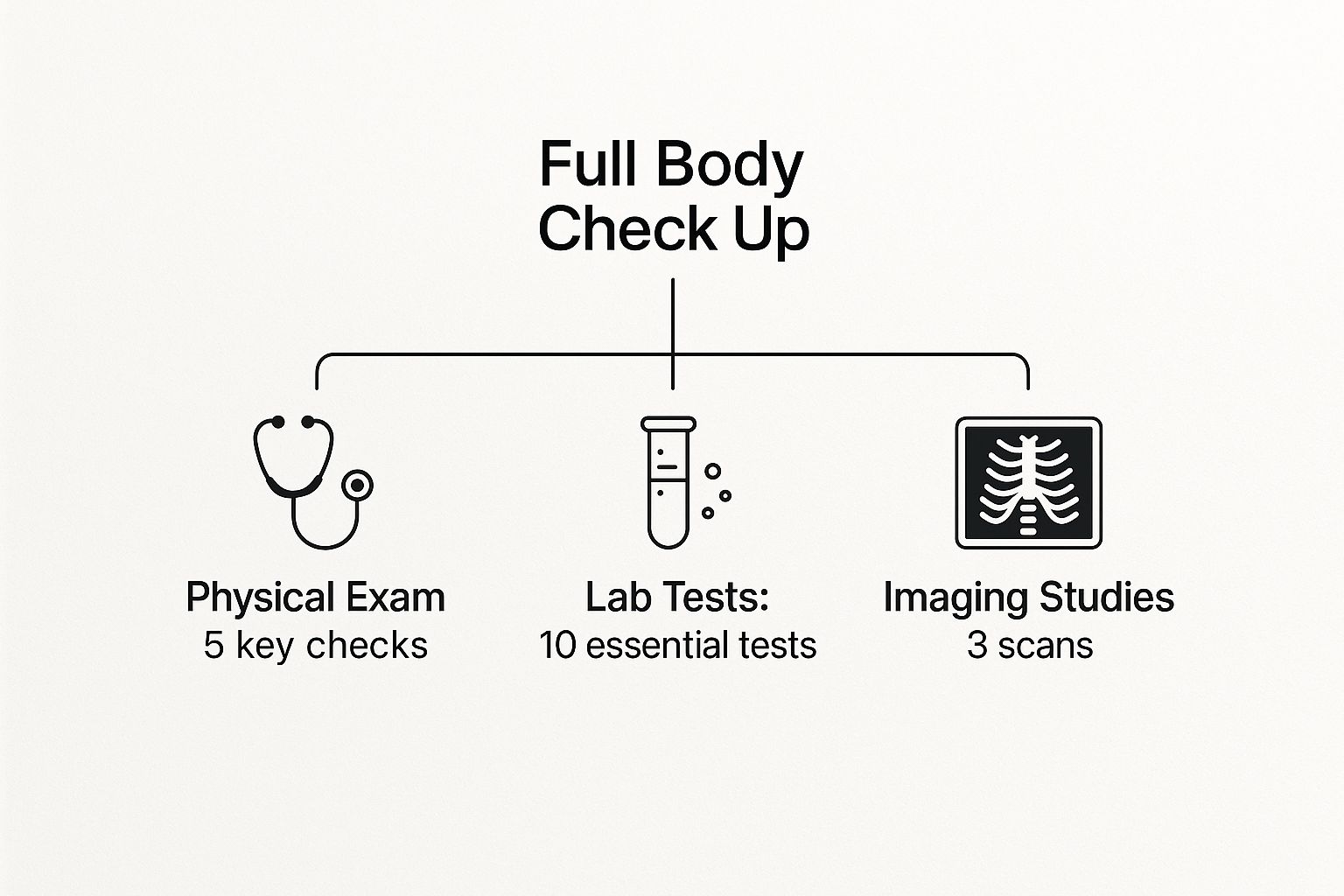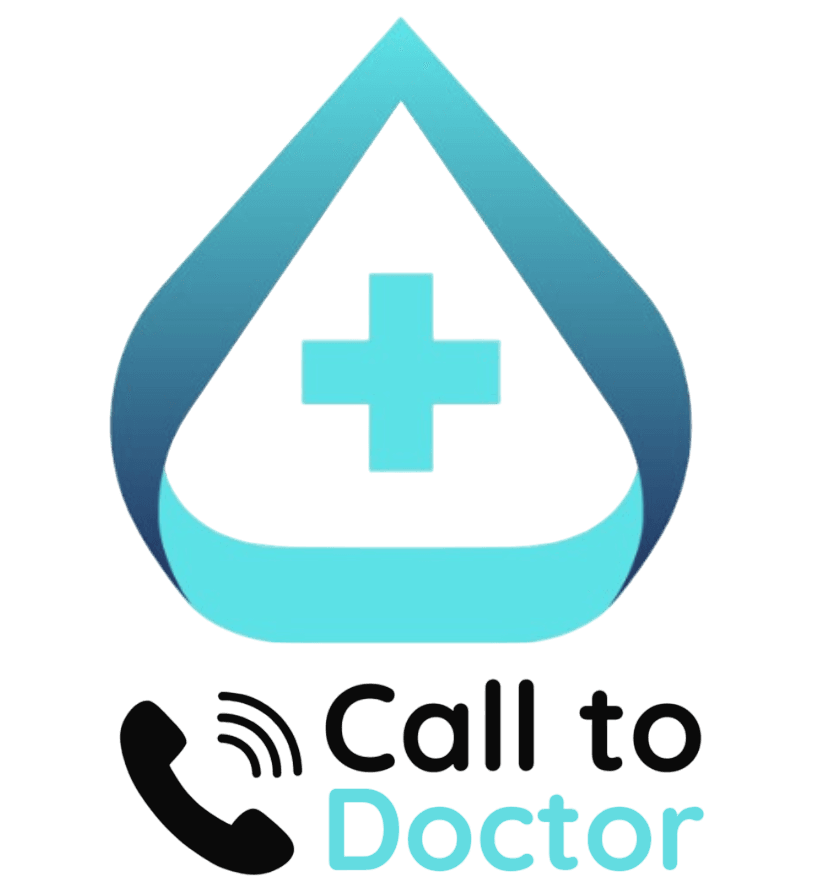A full body check up is a comprehensive series of medical tests designed to give you a clear and detailed snapshot of your overall health. The primary goal is proactive prevention—identifying potential health risks before they develop into serious conditions.
Think of it as a detailed annual service for your body. Just like a car, regular maintenance can spot small issues early, preventing major breakdowns and ensuring you run smoothly for years to come.
Why is a Full Body Check Up Important?
A full body check up isn’t just about reacting to illness; it’s a cornerstone of modern preventive medicine. By establishing a health baseline, you and your doctor can track changes over time, make informed lifestyle decisions, and take control of your long-term well-being.
This proactive approach empowers you. When you catch potential red flags early—such as rising cholesterol, elevated blood sugar, or minor organ irregularities—you can intervene immediately. Early detection nearly always leads to simpler, more effective treatments and better health outcomes.
The Power of Prevention
At its core, a health screening is about preventing problems before they start. It provides you with crucial knowledge about your body that you wouldn't have otherwise. With these insights, you can make meaningful lifestyle adjustments, whether that means tweaking your diet, increasing physical activity, or managing stress more effectively.
For instance, if your results show borderline high cholesterol, that’s an immediate signal to adjust your diet and exercise habits. This simple action could be enough to prevent serious heart disease down the road. It marks a fundamental shift from passively waiting for symptoms to actively managing your health journey.
This focus on prevention is a significant global trend. General health check-ups are a major component of the regional health screening market, accounting for 36.64% of revenue in the Middle East and Africa. You can discover more insights about the growing health check-up market to understand its growing importance.
Core Goals of a Full Body Check Up
This table outlines the primary objectives of a comprehensive health screening and what they mean for you.
| Goal | What It Means for You | Practical Example |
|---|---|---|
| Early Detection | Finding potential health issues before they cause symptoms or become serious. | A blood test reveals pre-diabetes, giving you the chance to change your diet and prevent full-blown diabetes. |
| Establish a Baseline | Creating a personal health record to track changes over time. | Your first check up shows healthy liver function. A year later, a small change is noted, prompting a discussion about lifestyle. |
| Risk Assessment | Identifying your personal risk factors for chronic diseases like heart disease or cancer. | High cholesterol and blood pressure readings might indicate a higher risk for cardiovascular problems, leading to a prevention plan. |
| Peace of Mind | Getting reassurance that you're in good health or gaining clarity on next steps if something is found. | All your tests come back normal, relieving anxiety you may have had about your health. |
| Lifestyle Motivation | Using concrete data to motivate positive changes in your diet, exercise, and habits. | Seeing your vitamin D levels are low encourages you to spend more time outdoors and take supplements. |
Ultimately, each goal empowers you with the information needed to take a proactive role in your own health.
Modern Convenience Meets Medical Insight
Not long ago, a full body check up meant booking multiple appointments and spending a significant part of your day at a clinic. Fortunately, healthcare has evolved.
Today, you can book an at-home sample collection, where a certified professional comes directly to your location. This eliminates travel and waiting room delays, making it easy to fit into any schedule. You receive a comprehensive health overview from the comfort of your home, making proactive wellness more accessible than ever.
Why Proactive Health Screenings Are Essential

In our fast-paced lives, it's easy to push health to the back burner, often only paying attention when a problem arises. This reactive approach is being replaced by a smarter strategy: proactive healthcare. Instead of waiting for symptoms, proactive care focuses on prevention and early detection.
This shift is crucial. With the rise of chronic lifestyle diseases like diabetes and heart conditions, waiting for a warning sign often means the issue is already well-established. A regular full body check up is your best defence. It provides an intelligence report on your body, turning uncertainty into clear, actionable insights and giving you control over your well-being.
Catching Issues Before They Escalate
The greatest benefit of proactive screening is detecting potential health problems in their earliest, most treatable stages. Many serious conditions, from high cholesterol to certain cancers, develop silently without obvious symptoms until they are advanced.
A proactive health check lets you spot subtle changes in your body’s chemistry—like rising cholesterol or blood sugar—long before they cause noticeable harm. This early awareness is the key to preventing minor issues from becoming major health crises.
By establishing a health baseline, each subsequent check-up allows you and your doctor to monitor trends and manage emerging risks. This consistent monitoring is a powerful investment in your future quality of life.
A Growing Regional Focus on Prevention
This shift toward preventive health is a major trend supported by public and private sectors. Government health initiatives and corporate wellness programs increasingly promote regular screenings to foster healthier communities.
The UAE and the wider Middle East health check-up market reflect this growing awareness. Valued at approximately USD 21.8 billion, it is projected to nearly double by 2031, signalling a strong regional commitment to preventive care.
Of course, understanding your results is as important as getting the tests. A general physician serves as your first line of defence, helping you interpret the reports and plan the best course of action. An annual check-up is one of the most effective tools for protecting your most valuable asset: your health.
What is Included in a Full Body Check Up?
When you schedule a full body check up, you are requesting a detailed analysis of your body's internal systems. Understanding what these tests measure demystifies the process and turns it into an empowering health review.
This infographic provides an overview of the main components of a comprehensive screening, including physical exams, lab work, and imaging studies.

As shown, a check-up is a multi-layered evaluation, with lab tests providing the most extensive diagnostic information.
Common Tests in a Health Check Up and Their Purpose
This table offers a simple guide to standard tests included in most full body screening packages and their purpose.
| Test Category | What It Measures | Why It's Important |
|---|---|---|
| Complete Blood Count (CBC) | Red blood cells, white blood cells, platelets, and hemoglobin. | Detects anemia, infections, clotting issues, and other blood disorders. |
| Lipid Profile | Total cholesterol, LDL ("bad"), HDL ("good"), and triglycerides. | Assesses your risk for heart disease and stroke. |
| Liver Function Test (LFT) | Levels of enzymes and proteins produced by the liver. | Identifies potential liver damage or disease before symptoms appear. |
| Kidney Function Test (KFT) | Creatinine and blood urea nitrogen (BUN) levels. | Evaluates how well your kidneys are filtering waste from your blood. |
| Blood Sugar Tests | Glucose levels, often through a Fasting Blood Sugar or HbA1c test. | Screens for pre-diabetes and diabetes to allow for early intervention. |
| Urinalysis | The physical, chemical, and microscopic content of your urine. | Checks for kidney problems, urinary tract infections (UTIs), and signs of diabetes. |
Each test provides a piece of the puzzle, contributing to a comprehensive picture of your overall health.
Foundational Blood and Urine Analysis
The starting point for any good check up is a set of foundational tests. The Complete Blood Count (CBC) is one of the most routine yet revealing analyses, measuring the different cell types in your blood—red cells, white cells, and platelets. A CBC acts as an internal surveillance report, flagging signs of infection (high white blood cells), anemia (low red blood cells), or clotting issues.
A standard urinalysis is equally vital. By examining your urine, it can detect early signs of kidney trouble, urinary tract infections, or diabetes by identifying substances that shouldn't be present, like protein, sugar, or blood cells.
Assessing Your Vital Organs
A full body check up also evaluates your hardest-working organs:
- Liver Function Test (LFT): This panel measures key liver enzymes and proteins. Abnormal levels can indicate liver damage or disease long before symptoms appear.
- Kidney Function Test (KFT): This test measures substances like creatinine and urea to assess how effectively your kidneys are filtering waste.
These organ-specific tests serve as an early warning system, monitoring critical systems and alerting you to potential issues while they are still manageable.
Checking Your Heart Health and Diabetes Risk
Heart disease and diabetes are major global health challenges. A full body check up includes specific tests to assess your risk factors for both.
The Lipid Profile measures cholesterol and triglyceride levels. High levels of "bad" cholesterol (LDL) are a major risk factor for heart disease, while high "good" cholesterol (HDL) is protective.
Understanding your lipid profile is one of the most empowering steps you can take for long-term heart health. It provides a clear, numerical snapshot of your risk, motivating lifestyle changes that can have a profound impact.
Additionally, blood sugar tests like Fasting Blood Glucose and HbA1c are essential for screening for pre-diabetes and diabetes. Early detection and management are key to preventing the long-term complications of these conditions. Thankfully, modern healthcare simplifies this process, as lab tests at home provide both convenience and accuracy for these crucial screenings.
How to Prepare for Your Health Screening

To get the most accurate results from your full body check up, a little preparation is key. Following a few simple steps ensures that the data collected is a true reflection of your baseline health, free from temporary fluctuations.
The Importance of Fasting
Fasting is one of the most critical preparation steps. It is essential for accurate blood sugar and cholesterol test results. Food and drink (other than water) can temporarily elevate glucose and lipid levels, leading to inaccurate readings.
An 8 to 12-hour fast is typically required. This means consuming no food and only water before your sample collection. Scheduling your at-home check up first thing in the morning makes this easy to manage. For more details on preparation, you can learn about getting blood tests at home in Dubai.
Key Preparation Checklist
Here is a quick checklist to follow in the 24 hours before your check-up:
- Stay Hydrated with Water: Drinking plenty of plain water makes blood collection easier by plumping up your veins and ensures accurate kidney function results.
- Avoid Strenuous Exercise: Intense physical activity can temporarily alter enzyme and protein levels, potentially affecting your liver and kidney function results. A light walk is fine.
- Limit Alcohol and Caffeine: Both can affect your blood pressure, heart rate, and hydration levels. It is best to avoid them for at least 24 hours before your screening.
- Get a Good Night's Sleep: Poor sleep can impact your blood pressure and other vital signs. Aim for a restful night to ensure your body is in a calm state.
Following these simple guidelines makes you an active partner in your healthcare. This small effort ensures your results reflect your genuine health, not just temporary factors.
Finally, have a list of any current medications and supplements ready to share with the healthcare professional.
The At-Home Full Body Check Up Process
Getting a full body check up at home has revolutionized preventive care. This modern approach brings professional healthcare to your doorstep, making the process convenient, quick, and comfortable.
It starts with easy online booking. Simply select a health package that suits your needs and choose an appointment time. This first step puts you in control of your health journey without disrupting your daily routine.
What to Expect During the Visit
A certified and trained medical professional will arrive at your home at the scheduled time with all necessary sterile equipment. They will collect your samples quickly and hygienically, prioritizing your comfort and privacy.
The sample collection typically involves a quick blood draw and sometimes a urine sample. The professional ensures the process is as painless as possible and can answer any questions. The entire visit is often completed within minutes.
The real magic of this service is how it combines professional medical standards with the comfort and privacy of your own home. It cuts out the usual obstacles to getting regular health screenings, like traffic, travel time, and sitting in a waiting room.
After collection, your samples are taken to an accredited lab for analysis. For those needing ongoing support, professional nursing services at home are also available for a wider range of health needs.
Receiving and Interpreting Your Results
The final step is receiving your health report. A detailed digital report is sent directly to you, typically within 24 to 48 hours. These reports are designed to be easy to read, translating complex medical data into clear, understandable insights. Each section outlines what was tested, your results, and the normal reference ranges, giving you direct, actionable information about your health status.
Frequently Asked Questions About Full Body Checkups
It's natural to have questions before booking your first full body check up. Here are answers to some of the most common queries to help you feel confident about taking this important step for your health.
How Often Should I Get a Full Body Check Up?
The recommended frequency depends on your age, health history, and risk factors. For healthy adults under 40, a check-up every two to three years is generally sufficient. After the age of 40, or if you have a family history of conditions like heart disease or diabetes, an annual check-up is highly recommended to stay ahead of potential health issues.
Is a Full Body Check Up Painful?
The primary procedure is a blood test, which involves a quick prick from a sterile needle. Most people describe it as a minor, momentary sting. The collection is performed by a certified professional phlebotomist and takes only a few seconds. Other parts of the screening, such as providing a urine sample, are entirely painless.
Think of that brief moment of discomfort as a small down payment for something huge: a crystal-clear picture of your health and the priceless peace of mind that comes with it.
What Happens If My Results Are Abnormal?
First, do not panic. An abnormal result is not a diagnosis but an indicator that a specific area requires further attention. Your report will provide context, but the crucial next step is to discuss the findings with a doctor. They can interpret the results within the larger context of your overall health and recommend the next steps, which could range from lifestyle modifications to follow-up tests. For a detailed consultation, you can schedule a home doctor visit in Dubai to review your report from the comfort of your home.
It's time to take charge of your health, and it's never been easier. Call To Doctor brings thorough, professional health screenings right to your doorstep, anywhere in Dubai. Book your at-home full body checkup today and get the insights you need to build a healthier tomorrow.



Leave a Reply